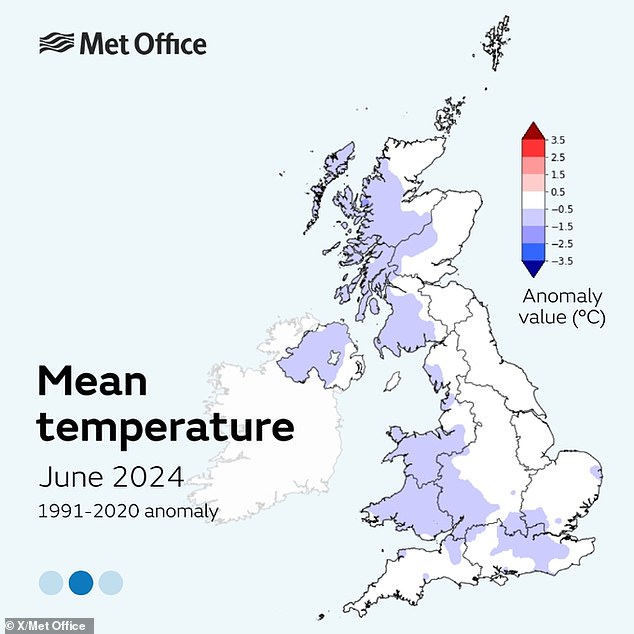Temperatures in June were ‘below average’ despite the late heatwave, according to the UK Met Office
June 2024 was a dry, cool and sunny month compared with the UK long-term average, according to preliminary figures from the Met Office.
The average temperature in June was 12.9°C (55°F), about 0.4°C lower than the long-term meteorological average.
June was for many a ‘month of contrasts’. The first half of the month was cool, but later in the month it was warmer. Rainfall was also relatively limited, especially in the south.
June was drier than average, with the UK seeing 29 percent less rain than the long-term meteorological average.
A total of 55.1mm of rain fell in the UK during the month.
According to the Met Office, the UK had a dry, cool and sunny June. Wales and southern England received much lower than average rainfall. Pictured, wet weather in Wimbledon, London, 15 June 2024

June 2024 was a dry, cool and sunny month compared to the UK long-term average, according to preliminary figures from the Met Office
Wales and the south of England saw much lower rainfall than average, compared to the rest of the UK.
In Wales, 1.8 inches (48.1 mm) fell, which is 48 percent less than average. In the south of England, 0.97 inches (24.8 mm) fell, which is 58 percent less than average.
Northern Scotland saw above average rainfall of 122.0mm, 32 percent more than the June average.
A Met Office spokesman said: ‘Temperatures in the first two weeks of June were around 2°C below average.

June was a month of contrasts for many, with a cool first half of the month offset by warmth later in the month. Pictured: Beachgoers in Brighton, 26 June 2024

Britons had to wait for warm weather even as summer officially began. Pictured: Beachgoers in Brighton, June 26, 2024
‘This was due to northerly winds bringing cold Arctic air across the UK, delivering a cool start to the meteorological summer.
‘The second half of the month saw high pressure as the jet stream moved north, bringing warmth to many, especially in the south.
‘Some areas in south-east England experienced days of temperatures above 28°C.’
According to the Met Office, the maximum temperature on June 26 was 30.5 degrees Celsius in Wisley in Surrey, making it the hottest day of the year so far.
There were several locations that met the criteria to be considered a heat wave, described as a local heat wave. However, the heat wave was not a widespread phenomenon.
The warm weather, however, was short-lived, with temperatures hovering around or below average during the last few days of the month.
The spokesman said there is “uncertainty around the forecast” but that temperatures could rise back to average or slightly above this week after a cooler week.
“At the moment the weather forecast does not indicate a heat wave, but the details will become clearer as the week progresses,” the spokesperson said.
‘As for the second half of the month, that is simply too far ahead to give such details at this time.’
